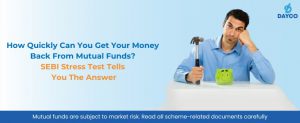How Quickly Can You Get Your Money Back From Mutual Funds SEBI Stress Test Tells You The Answer
![]() April 2, 2024
April 2, 2024
![]() 0 Comments
0 Comments
Back in 2020, as COVID-19 raged, people started panic selling. In this chaos, one mutual fund AMC found it hard to keep up with this sudden surge in redemption. Six of its debt funds did not have enough liquidity!
As a result, the fund house had to suspend redemption from and investment in these funds. The result? A lengthy legal battle between the fund house and the investors.
It took three years for these funds to be completely liquidated.
SEBI Stress Test For Mutual Funds
What if something like this happens again? The latest directive comes on the back of increasing valuation of smallcap and midcap funds. These funds have been on an upward movement trajectory for quite some time now. Against this backdrop, SEBI asked the Association of Mutual Funds in India (AMFI) to direct AMCs to conduct stress testing of its funds.
SEBI circular on stress testing of mutual fund schemes isn’t something new. In 2015, the regulator asked fund houses to stress test their liquid and money market funds.
Small and midcap funds have seen spectacular growth over the last year. Market experts and primarily SEBI are now worried that the small and mid-cap space is frothed and about what might happen when the trend reverses. Market corrections induce panic among investors and lead to redemptions. It leads to large redemptions, especially in small and mid cap space where corrections can be severe. During the COVID induced correction in Mar 2020, smallcap funds on an average corrected by more than 20% in a week. As investors redeem in large numbers the cash lying with mutual funds to meet redemption pressure deplete. In order to meet the redemptions, they start selling the shares at lower and lower prices. This can lead to a sharp correction in the NAV of any mutual fund but more in the case of funds holding small and midcap stocks due to the higher liquidity risk.
So, Can mutual funds withstand panic selling?
The primary objective of this stress test is to identify the true liquidity of smallcap and midcap funds:
- How long will it take for an AMC to redeem or sell 25% of its portfolio?
- How long will it take for an AMC to redeem or sell 50% of its portfolio?
Apart from this, the regulator also sought other metrics on market cap exposure, volatility, and valuations from mutual funds.. We will talk about these metrics in a while.
The Results Are Out
Following the directive, most mutual fund houses have submitted the stress test results.
To download the complete stress test result - Click here
Correlation:
The stress test results have shown some interesting correlations. The most important correlation is the fact that the bigger the AUM of a small cap or a midcap fund, the longer it will take for the fund house to sell 50% or 25% of the portfolio.
For example, Nippon India smallcap fund with an AUM of Rs.46029.84 crore will take 27 days and 13 days to sell 50% and 25% of its portfolio respectively. On the other hand, UTI smallcap fund with an AUM of Rs. 3649.49 crore will take 5 days and 3 days to sell 50% and 25% of its portfolio.
However, correlation is not causation. There are some Mutual Funds that will take as much as 35 days and 60 days to sell 50% of their portfolios.
The biggest takeaway is,
- It will take around 20 to 27 days for smallcap funds with large AUM to sell 50% of its portfolio
- It will take around 12 to 20 days for midcap mutual funds with large AUM to sell 50% of its portfolio
The stress test results have identified some smallcap and midcap mutual funds that might face trouble during panic selling. For example, the Kotak midcap fund (emerging equity) will take around 34 days to sell 50% of its portfolio, while the SBI smallcap fund will take 60 days to sell 50% of its portfolio.
Other Metrics of The Stress Test
The stress test also measured the liquidity of these funds in terms of other metrics:
- Concentration: % exposure of top 10 investors in the fund and the market cap wise exposure of its AUM.
- Standard Deviation and Beta: Standard deviation of the fund along with the benchmark and the beta of the fund for understanding volatility.
- Portfolio Trailing PE For The Last 12 Months: 12 month trailing PE of the fund with the 12 month trailing PE and PE history of the benchmark
- Portfolio Turnover Ratio: % change in fund’s portfolio over a one year period- through buying or selling.
Final Word
The stress test initiative undertaken by SEBI and AMFI is a forewarning for investors in these funds. It will help investors understand the liquidity risk in the portfolio from time to time which was not statutorily disclosed by AMCs earlier. Remember that small and midcap categories of funds are inherently riskier and the stress test is also a test for extreme redemption pressure. You should only invest in these funds if you have a long-term goal (at least five years away) and a high-risk appetite. Merely investing in these funds for long-term goals is not enough. You should also have a proper asset allocation plan in place which helps you mitigate the risks associated with these funds.
Share With
I'm a cool paragraph that lives inside of an even cooler modal. Wins!
Are you sure?
In case you didnt know, you can open your account online within 24 hours. Offline account opening takes up to 4 working days. If you wish to open your account offline, fill and sign the forms using a black/blue ballpoint pen. Please fill in the email and mobile number of the applicant to avoid account opening delays.
Enter Password
Please enter your details and password
New to Dayco?
Enter Password
Please enter your details and password
New to Dayco?
Filing Complaints on SCORES (SEBI) – Easy & Quick
- Register on SCORES Portal (SEBI)
- Mandatory details for filing complaints on SCORES:
- Name, PAN, Address, Mobile Number, E-mail ID
- Benifits:
- Effective Communication
- Speedy redressal of the grievances
Thanks !!
Your details were successfully received.

Thank you for Your Feedback!
Our Team is working constantly on improving our user experience and your feedback really means a lot.
Thanks !!
App Link Send to your mobile number successfully.
Thank You
All your Questions have been recorded
Thank You
All your Questions have been recorded
Thank You!
Thank you for your response. We'll get in touch with you at the earlisest for your investment planning needs
NEXT
Thank You!
Thank You for your interest in our Moderate Equity Portfolio. Please find below the credentials to track this portfolio:
User ID: mockmod@daycoindia.com
Password: abcd@1234
Portfolio Tracker
Please Read!
Risk profiling is crucial for identifying and managing potential risks in investment decisions. Please carry out your risk profiling before making any investment decisions.
Complete Risk Assessment Now
Thank You !!
Please enter your details to download/print the report
Thank You !!
Please enter your details to download/print the report
Thank You !!
Please enter your details to download/print the report
Thank You !!
Please enter your details to download/print the report
Thank You !!
Please enter your details to download/print the report
Set Your Goal
Please Select an option from below
Set Your Goal
Please Select an option from below
Thanks You !
We appreciate your interest in our services. Our team will be in touch with you shortly.
CloseSet your Goal
Please enter your details in the fields provided
Thanks You!!
Calculation report has been sent to your mail id successfully
Clear form?
This will remove your answers from all questions and cannot be undone.



 Book Appointment
Book Appointment









Leave a Reply